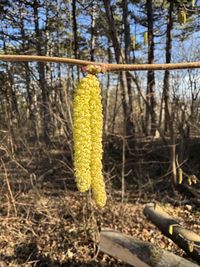Pollen information for Burgenland from 23 February 2026
First peak levels of pollen from early bloomers!
After the abrupt onset of winter at the weekend, a significant change in the weather is imminent in the coming days, which will bring numerous hours of sunshine and temperatures well above 10 °C. In Burgenland, the weather will remain dry for the most part - ideal conditions for intensive pollen counts. In Burgenland, it will remain dry for the most part - ideal conditions for intensive pollen counts.
At the beginning of the week, there may still be precipitation in places, which will at least somewhat dampen the otherwise rapid increase in pollen count. However, in those regions of Burgenland where there is no rain, high levels of pollen from early bloomers can be expected as early as Monday.
Currently, tree and shrub hazel pollen is the main allergen. In the coming days, pollen grains from the native grey alder will also be increasingly present.
As hazel and alder are closely related botanically, their allergens, i.e. the proteins that trigger symptoms in allergy sufferers, are also structurally very similar. This can lead to cross-reactions, which further increases the burden for sensitised people.
In addition to the pollen types mentioned above, the following are also represented in the pollen spectrum: Cypress plants. However, they only have a very low potential for allergic exposure.
Flowering alder/hazel | at |
Andau | ready to flower |
Eisenstadt | ready to flower |
Kleinzicken | ready to flower |
Lutzmannsburg | ready to flower |
Mönichkirchen | ready to flower |
Neusiedl Am See | ready to flower |
Forecast date: 2026-02-23
Note: The data shown here are model data for the expected start of flowering. For more detailed information on the expected pollen count, please refer to the text forecasts.
Responsible for the content
AZ Pollenresearch GmbH
im Auftrag der Burgenländischen Landesregierung.
Dr. rer. nat. Johannes M. Bouchal und Lukas Dirr, MSc.
Wetterdaten und Prognosen basierend auf synoptischen Daten:
GeoSphere Austria, Bundesanstalt für Geologie, Geophysik, Klimatologie und Meteorologie (ehemals ZAMG).
zum Team


